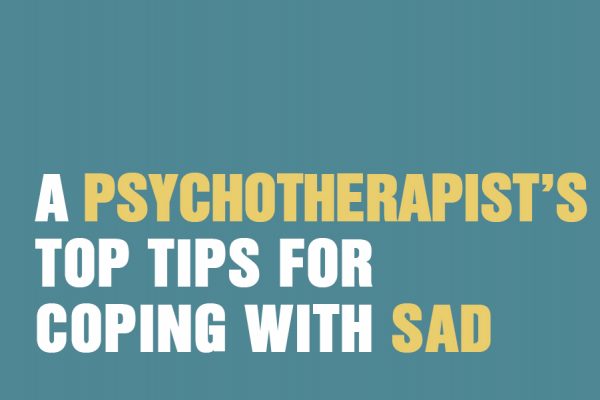The days are getting shorter and nights are becoming darker, and the weather is taking a turn. We’re stepping into winter, which can mean that some of us begin to feel low as the season changes. Seasonal Affective Disorder (SAD) is a specific type of mental illness that can set in as winter starts, leaving you tired, irritable, and just plain fed up.
Seasonal Affective Disorder can be quite a jarring experience, but there are ways to prepare for the onset and help you feel better during these darker days. In this blog, we’ll explore the different SAD symptoms, as well as give you some tips to look after your mental health and make your winter seem a little brighter in the face of Seasonal Affective Disorder.
What is Seasonal Affective Disorder?
Seasonal Affective Disorder is a type of seasonal depression that is triggered by the transition from the lighter, longer summer days to darker winter nights. As the symptoms tend to be more prominent in the winter months, it is often known as the “winter blues”, but some people experience SAD the other way around. This means that they feel worse during summer but better in winter.
Mental health professionals aren’t entirely sure what the cause of SAD is. However, the most common explanation is that the lack of natural sunlight causes a part of the brain to stop working as well which could lead to problems with the production of melatonin, the production of serotonin, or the body’s internal clock. In some cases, it could even be genetic.
Symptoms of SAD look very similar to symptoms of depression and major depressive disorder. A persistent low mood, a loss of interest in hobbies and everyday activities, irritability, feelings of despair or lethargy are all signs that something is amiss. Physically, you also might notice that you’re sleeping longer than normal orcraving carbs. For some, these symptoms can be incredibly severe and debilitating.
How Can You Prepare for Seasonal Affective Disorder?
If any of the signs of Seasonal Affective Disorder are resonating with you, you might be wondering the best way to look after yourself and manage your mental health throughout the winter months. Talking to your doctor about Seasonal Affective Disorder can give you some insights into the best treatment plan for relieving SAD symptoms using things like antidepressant medication, but there are also some self-care techniques you could try.
Below are some tips to help you manage and alleviate symptoms and prepare for the effects of Seasonal Affective Disorder.
Let the Sunshine In
As one of the most common explanations for SAD is lack of natural sunlight, you’ll want to prepare for Seasonal Affective Disorder by finding ways to get more sunshine and vitamin D into your day. Consider adjusting your schedule so you can get a lunchtime walk in, or else have your mid-morning coffee outside to make the most of the rays while you’re working. Some even suggest light box therapy and the use of sunlight lamps to help simulate the effects of the sun on particularly cloudy and dark days, but it’s worth noting that it’s not clear whether artificial light has the same mental health benefits.
Schedule Time with a Therapist
Much like with other types of depression, talking therapies such as cognitive behavioural therapy or counselling can be an effective way to lessen symptoms of Seasonal Affective Disorder. If you don’t already work with a therapist or counsellor on a regular basis, it’s certainly worth exploring your local options to find a mental health professional who will be able to offer you coping strategies and support your mental well being. With a therapist or counsellor in your corner, you might find that your low mood and irritability is lessened as you discover more about your triggers and how to manage them through talk therapy.
Stick to a Regular Sleep Schedule
Some of the key symptoms of seasonal depression are to do with sleep: lethargy and sleeping longer than usual. People with the winter blues can find themselves napping during the day, spending active time in bed during the day (for example, watching tv), and then struggling to wake up again the following morning.
To prepare yourself and manage these seasonal depression symptoms, you might want to experiment with a regular sleep schedule and proper sleep hygiene. This means going to bed and waking up at the same time every day (set extra alarms if you need to!), only using your bed for sleep or wind-down activities, and trying to refrain from napping during the day. If you’re able to relieve stress at work or home, this might also make it easier to get a restful night.
Decorate Your Den
Typical UK winters often have dark and dingy days when you just don’t know what to do with yourself. You manage Seasonal Affective Disorder during cold weather by spending time redecorating your space to make sure it feels warm, welcoming and cosy. Not only are you keeping yourself occupied, but you’re also getting that chance to unleash your creativity and have a bit of fun. The end result would also mean that your space brings you more joy, and is a way to combat Seasonal Affective Disorder on its own.
There are many self-care tactics and lifestyle changes that you can use to prepare for the onset of Seasonal Affective Disorder, with a lot centring around your routines and daily schedules. In the run-up to the darkest winter months, you can spend some time experimenting with your ideal schedule without having to factor in your symptoms, which you can then stick to as the days get shorter.
On top of self-care, we also recommend seeking the support of a therapist or counsellor. Talking therapies have been shown to have a great impact when it comes to lessening the symptoms of Seasonal Affective Disorder. Book a consultation with one of the team at The Awareness Centre today, and discover how talking therapies can help you to manage the symptoms of Seasonal Affective Disorder throughout the winter.








